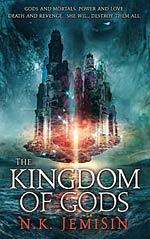
![]() thecynicalromantic
thecynicalromantic
3/12/2014
![]()
I just finished reading N. K. Jemisin's The Kingdom of Gods, the third book in her Inheritance trilogy. (As is happening more and more often these days, when I say I read it, I mostly mean that I had Mark Oshiro read it to me.)
This book has its own arc, taking place quite a while after the end of the second book, but it also serves wraps up the overarching storylines and themes in the trilogy as a whole, which is essentially the story of the second era of the Three. The narrator in this third volume is Sieh, who has appeared in the first two books as a trickster god and the god of childhood, and is the oldest and most powerful of the godlings (the minor gods who are the children of the Three).
Sieh, it turns out, is powerfully lonely. He is envious of the Three, even after their centuries of fighting one another, and he yearns for a love as complete as theirs, and is kind of a brat to everyone else about it. He meets and befriends two young Arameri siblings, a blonde white girl named Shahar and a brown boy named Deka who are nevertheless twins, and then everything goes completely bonkers. The three of them accidentally blow up part of Sky, Sieh spends eight years in a coma in Nahadoth's belly and wakes up turned partly mortal and aging, a previously unknown godling of revenge is stalking Sieh over some secret that Sieh has no idea what the hell it could possibly be, and somebody is slowly but steadily killing off the entire Arameri family with magical poisoned masks and, apparently, has been for generations. Also maybe the Apocalypse is happening? This book isn't about "saving the world" in any kind of middling, metaphorical "keep our country/civilization more or less the way it was" kind of way; the stakes in The Kingdom of Gods come down to whether or not they can prevent the bad guy from unmaking the universe. I don't want to give too much plot away because there's massive game-changing curveballs every chapter or two (which has been pretty much par for the course in this trilogy—I don't know how she does it!).
The characterization is great—Sieh, while basically a total brat, is a humorous and entertaining narrator, one you can often sympathize with even when he's not being particularly likeable (or, like, having his pet necklace planet murder people). The last vestiges of the Arameri are very, very strange people, some of them just starting to learn about introspection and compromise and paying attention to other people for the first time in millennia. Shahar is determined to be good but sometimes has a pretty vague concept of what that means, as she is being groomed to be the new head of the Arameri family. Deka is sent off to scrivener school and basically uses that time to level up until he is the most ridiculously magically souped-up human ever, at which point he is both adorable and goddamn scary. Their mom is… hard to describe. There's a whole slate of memorable secondary characters, including Ahad, the guy who was Nahadoth's day-self in his captivity but is now a separate entity who is basically a godling but doesn't know his nature; Glee Shoth, Itempas and Oree's fiercely no-nonsense daughter; Hymn, an impoverished local girl who Sieh kind of befriends but who finds him largely to be a problem; and Usein Darr, bosstastic new ruler of Darr who is leading the revolt against Arameri rule. There are also a ton of awesome cameos by Yeine, Nahadoth, and Itempas, which range from funny to cute to heartbreaking.
One of the more unique aspects of this book, which can be a little jarring sometimes but which overall I think works, is the passage of time. Sieh manages to skip years at a time, sometimes just because nothing happened, sometimes because he's asleep or unconscious or recuperating inside Nahadoth or some other weird shit. The variety in the lifespans of the characters is huge, so skipping months or years or decades has a much larger effect on Sieh's relationships with some characters than with others. Oree Shoth is apparently still around nearly a century after her story takes place. The time jumps really illustrate how much this trilogy is the story of AN ENTIRE ERA, not just an entire era in human history but an entire era in the universe's history, and in the history of the gods. And these eras are begun and ended through the god-sized and god-powered versions of ordinary family drama stuff—love and loneliness and jealousy and spite and judginess and marriage and sex and children and kindness and loyalty and people being assholes to each other. Also murder, sometimes. It's epic in the way that ancient mythologies are epic, in the period where humans had started to conceive of something bigger than just the god of this tree or that spring, but before we'd come up with something quite as all-encompassingly boring as monotheism. A universe where there are beings who can unmake it because they've spent eons stewing in the resentment of Daddy didn't hug me enough is a universe with the capacity for real drama, and Jemisin, having gone and created such a world, certainly doesn't stint on the drama. None of it feels cheap or soapy, either (although I think soapiness gets a bad rap, but that's for another time); it's really engaging and obviously the end of the universe is quite serious business.
I very much intend to pick up the Dreamblood duology at some point; I don't know what it's about but supposedly it's even weirder than this series. Which should be fun!
Originally posted at http://bloodygranuaile.livejournal.com/42916.html.
http://bloodygranuaile.livejournal.com